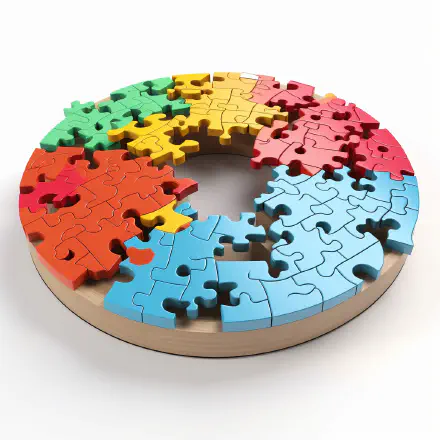
Description
In today’s world, complex problems abound. From climate change to economic instability, the challenges we face often require more than just technical expertise. Emotional intelligence is also a vital component of effective problem-solving. This article explores the emotional side of navigating complexity, offering insights and strategies for enhancing our ability to tackle difficult issues. Whether you are a leader, a team member, or simply someone who wants to make a difference in the world, this article will provide valuable guidance for improving your problem-solving skills.
Introduction
Solving complex problems is not merely a task of intelligence, but also of emotional intelligence. Emotions can influence our decision-making, reasoning, judgment, and ability to navigate uncertainty effectively. This article aims to explore the human side of problem-solving, emphasizing the role of emotional intelligence in navigating complexity successfully.
Complex problems are those that require novel solutions involving multiple variables, stakeholders, and sources of information. In today’s fast-paced and interconnected world, complex problems have become more frequent and demanding. Thus, individuals and organizations need to develop their emotional intelligence to cope with such challenges effectively.
This article will discuss the impact of emotions on problem-solving, embracing uncertainty, and enhancing emotional intelligence for problem-solving. By developing self-awareness, social skills, mindfulness, and other emotional intelligence competencies, individuals can improve their problem-solving abilities and well-being.
Overall, this article intends to provide insights and techniques for developing emotional intelligence in complex problem-solving. Let’s dive deeper into the emotional side of problem-solving!
Understanding the Emotional Side of Complex Problems
The Impact of Emotions on Problem-Solving
Emotions play a crucial role in decision-making, particularly when addressing complex problems. While many people consider decision-making as a rational process based on logic and analysis, it is worth noting that emotions equally influence reasoning and judgment, affecting how we perceive the problem and its potential solutions.
For example, in the face of uncertainty, fear and anxiety can quickly take over, causing individuals to act impulsively or make hasty decisions that may not reflect their true capabilities. In contrast, emotions such as curiosity, optimism, and perseverance, can enhance problem-solving abilities, allowing people to approach complex situations with an open mind and a willingness to explore new solutions.
Embracing Uncertainty
Another area where emotions can significantly impact complex problem-solving is in dealing with uncertainty. Uncertain outcomes can be daunting and cause people to feel overwhelmed and hesitant. However, it is essential to accept the reality of uncertain situations and understand that some level of ambiguity will always be present in complex problems.
One way to manage uncertainty is by challenging limiting beliefs that may hold us back, creating mental blocks and fear. By adopting a growth mindset and reframing our beliefs, we can become more open to new experiences and increase our resilience.
In addition, mindfulness techniques such as deep breathing, meditation, and visualization can help to reduce anxiety and promote a sense of calmness, even in the face of complexity and uncertainty.
Enhancing Emotional Intelligence for Problem-Solving
Emotional intelligence (EI) is the ability to identify and manage our own emotions and the emotions of others. By developing EI, individuals can improve their problem-solving abilities and become more resilient and adaptable in complex situations.
Self-Awareness
Self-awareness is the foundation of emotional intelligence, as it involves recognizing and controlling our emotional triggers. People who are self-aware understand their emotional responses and how they influence their decisions, allowing them to manage their emotions more effectively.
Developing self-compassion and empathy can also enhance self-awareness, as it encourages people to be more understanding and accepting of themselves and others, promoting a positive mindset that fosters creativity and innovation.
Social Skills
Social skills are also essential for problem-solving, as they involve effective communication, collaboration, and conflict resolution. Strong social skills enable individuals to build relationships and trust with others, promoting teamwork and enhancing creativity and problem-solving abilities.
To improve social skills, individuals can practice active listening, constructive communication, and empathetic understanding, actively seeking and valuing diverse perspectives and ideas.
Mindfulness
Mindfulness is another important practice for emotional intelligence, as it involves staying present and engaged, without becoming overwhelmed by complex problems or negative emotions. Mindfulness techniques can help individuals to regulate their emotions, manage stress, and improve overall well-being, thus enhancing problem-solving abilities and promoting resilience.
In conclusion, the emotional side of complex problem-solving cannot be underestimated, as it plays a vital role in decision-making, dealing with uncertainty, and enhancing overall well-being. By developing emotional intelligence skills such as self-awareness, social skills, and mindfulness, individuals can become more effective problem-solvers, promoting resilience and adaptability in the face of complexity.
Enhancing Emotional Intelligence for Problem-Solving
Emotional intelligence is not an innate trait but a skill that can be learned and developed through intentional efforts. In enhancing emotional intelligence for problem-solving, there are three aspects to consider: self-awareness, social skills, and mindfulness.
Self-Awareness
Self-awareness is the ability to recognize and understand our emotions, thoughts, and behaviors. It is the cornerstone of emotional intelligence and a necessary skill for effective problem-solving. To enhance self-awareness, consider the following:
“Self-awareness gives you the capacity to learn from your mistakes as well as your successes. It enables you to keep growing.” - Lawrence Bossidy
- Identify your emotional triggers and learn to manage them. Emotional triggers are internal or external factors that elicit strong emotional reactions. By recognizing and acknowledging them, you can learn to regulate your emotions and make more rational decisions.
- Practice self-compassion and empathy for others. Self-compassion involves treating oneself with kindness, care, and understanding. Empathy is the ability to understand and share the feelings of others. These skills can help you better understand yourself and others, leading to more effective problem-solving.
Social Skills
Social skills involve our ability to communicate effectively, collaborate with others, and build relationships. They play a crucial role in problem-solving, as many problems require input and cooperation from multiple parties. To enhance social skills, consider the following:
“It is literally true that you can succeed best and quickest by helping others to succeed.” - Napoleon Hill
- Improve communication and collaboration. Effective communication involves active listening, clarity, and understanding the other person’s perspective. Collaborating involves working together to achieve a common goal. Learning these skills can help you work more effectively with others to solve complex problems.
- Build relationships and trust with others. Building strong relationships and trust involves treating others with respect, honesty, and integrity. It also involves being reliable and following through on commitments. These skills can help you build a support network that can provide valuable insights and perspectives.
Mindfulness
Mindfulness is the ability to stay present and engaged in the current moment. It involves paying attention to one’s thoughts and feelings without judgment. Mindfulness can help reduce stress, increase well-being, and improve problem-solving abilities. To enhance mindfulness, consider the following:
“Mindfulness is about being fully awake in our lives. It is about perceiving the exquisite vividness of each moment.” - Jon Kabat-Zinn
- Practice staying present and engaged in the current moment. This can involve simple techniques like breathing exercises, guided meditations, or body scans. These techniques can help you develop a greater sense of clarity, focus, and calmness that can be useful in problem-solving.
- Learn techniques for managing stress and improving overall well-being. Stress can be a major hindrance to problem-solving. By learning techniques such as mindfulness-based stress reduction or yoga, you can reduce stress and improve overall well-being, leading to more effective problem-solving.
In summary, enhancing emotional intelligence involves developing self-awareness, social skills, and mindfulness. By intentionally working on these skills, we can become more effective problem-solvers, better able to navigate the complex challenges we face.
Conclusion
In conclusion, navigating complex problems requires not only knowledge but also emotional intelligence. The impact of emotions on problem-solving cannot be overstated. We have discussed how emotions can affect reasoning, judgment, and decision-making, hindering the problem-solving process. We have also explored techniques for managing uncertainty, fear, and anxiety.
Enhancing emotional intelligence is crucial for problem-solving. Self-awareness, social skills, and mindfulness are paramount. Developing self-compassion and empathy for others, improving communication and collaboration, building relationships and trust, and learning to stay present and engaged are fundamental to solving complex problems.
In these times, we must understand that emotional intelligence is not a luxury, but a necessity. By investing in emotional intelligence skills, we not only solve problems more effectively, but we also develop a sense of resilience and well-being that will be helpful in all aspects of life.
Let us encourage one another to keep developing our emotional intelligence skills. As we continue to navigate the complex world we live in, may we be mindful of the emotional side of problem-solving and use it to our advantage.
As Elliot Eisner rightly said, “The capacity to think critically, to question the status quo, to imagine the alternatives, to visualize a better future—that is what our task is.”

